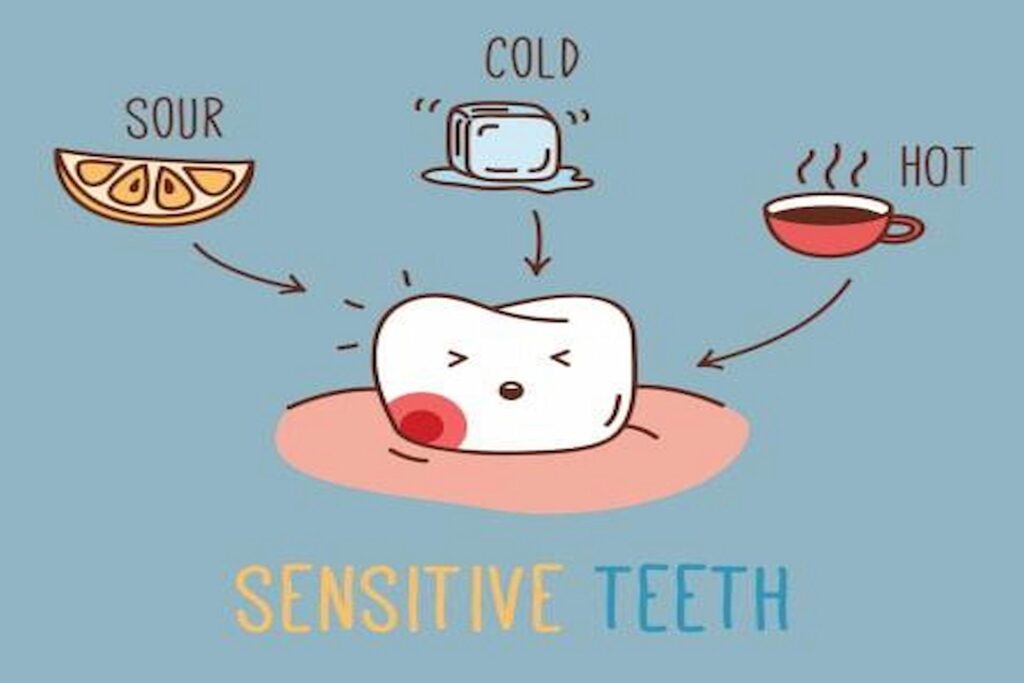A good tooth’s enamel shields the dentin, the softer layer beneath, from damage. The gums additionally shield the roots. The dentin’s protective layer is removed if the enamel or the gums deteriorate. Dentin is vulnerable to dental decay, fracture or cracking, enamel wear and tear from the gums, and tooth root erosion. As a walk in dentist in Thornhill explains, sensitive tooth’s dentin is linked to a pain-producing nerve. Thousands of small tubules or canals in the dentin reach the tooth’s pulp. These tubules enable the passage of heat, cold, acidic, or viscous substances to the nerves inside the tooth when exposed to specific conditions, resulting in pain.
Causes Of Tooth Sensitivity
Tooth sensitivity can be caused by a variety of circumstances, such as the following:
A Harsh Toothbrush Or Improper Brushing Techniques: It can wear down the enamel of teeth and expose the dentin, leading to gum deterioration.
Gingival Erosion: It is often observed in people suffering from gum or periodontal diseases.
Tooth Fracture Or Crack: The tooth pulp becomes inflamed because the fracture or crack is filled with germs brought on by plaque buildup. When the damage is more serious, the tooth abscesses and is infected.
Grinding Teeth And Pressing Teeth Together: This habit leads to the wear of tooth enamel.
Use Of Teeth Whitening Products: Whiteners have ingredients that erase stains, but occasionally these substances can harm tooth enamel.
Plaque Accumulation
Long-Term Use Of Mouthwash
Acidic Foods: Consuming these substances wears away tooth enamel.
Dental Operations: After scaling, root planning, veneering, and other crucial procedures, the tooth becomes sensitive. Usually, the pain goes away after 4 to 6 weeks.
After Filling: the tooth sometimes becomes sensitive after filling the hole caused by decay.
Fortunately, dental filling-related tooth sensitivity will subside in a few weeks. However, ongoing tooth sensitivity suggests a need for nerve extraction.
Treatment Of Tooth Sensitivity
Tooth sensitivity never totally goes away; only the symptoms’ intensity changes for the better or worse, or even the symptoms themselves appear to be relieved. However, the sensitivity will occasionally return as long as there is a cause for it.
Each dentist prefers and typically suggests a certain therapy for tooth sensitivity.
The following describes the most commonly used methods of treating tooth sensitivity.
Fluoride Therapy
Sensitive dentin and enamel are strengthened by applying fluoride gel or varnish, reducing the pain and discomfort caused by sensitivity.
Bonding And Coating
Bonding, veneers, or inlays repair tooth decay or defects causing sensitivity.
Sealant
If the loss of the protective covering of the roots is the reason for the tooth’s sensitivity, using a sealant or groove cover will be a suitable treatment. The dentist covers the painful area with a special sealant and prevents stimuli contact with the sensitive tooth by covering the surfaces with grooves.
Use Of Mouthguards
If tooth sensitivity results from grinding teeth, the dentist will take a mold of the teeth. The mouth guard or night guard is made from a mold. Nightguard protects the teeth from pressure and damage and reduces the pain caused by tooth sensitivity.
Root Canal
If the tooth’s sensitivity is not resolved despite the above treatments, nerve extraction will be performed. The dentist removes the soft pulp inside the tooth to remove the sensitivity.
Gum Transplant Surgery
If the tooth has become sensitive due to the decay of the gum and the root is exposed to damage, gum transplant surgery is performed to protect the root and reduce sensitivity. The dentist takes the gum grafts from the tissues of different mouth parts and then transplants them to the sensitive area.
Home Treatment
The following simple home remedies are suggested to reduce tooth sensitivity:
- Use of anti-allergic toothpaste: ask the dentist to introduce the right toothpaste.
- To brush sensitive teeth, use fluoride toothpaste, not the scale remover type and controller.
- Before going to bed, apply anti-allergic toothpaste on the exposed roots.
- Use a soft toothbrush.
- Do not eat foods with high acidity.
- Use fluoride mouthwash every day.
- If you have a habit of grinding your teeth, use mouth or night guards.

